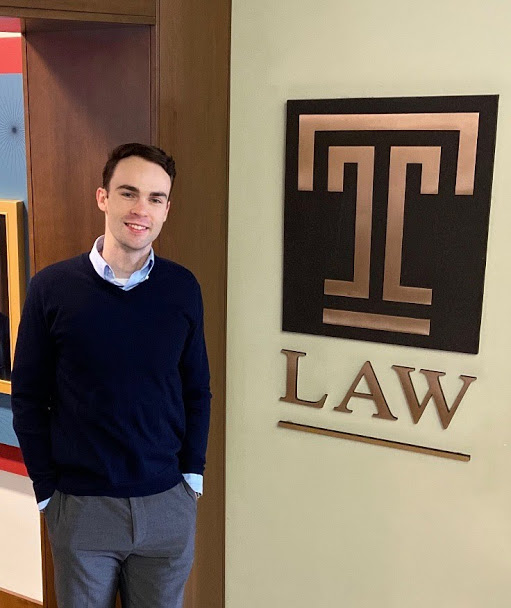Connor McElwee LAW ’21
Connor McElwee is a member of the Temple Law Class of 2021

One of the benefits of being a Temple Law student is the opportunity to step out of the classroom and work in the field with practice area experts. As a participant in the Center for Compliance and Ethics Practicum, I have had the opportunity to build fundamental skills in healthcare compliance. Through the efforts of Professor Jon Smollen and Bea Raccanello, of the Center for Compliance and Ethics at Temple Law, I have been given the opportunity to intern with Temple University Health System and experience the day-to-day work of a compliance department in a major healthcare entity. No textbook or class discussion can measure up to the benefits of an experience like this one.
I have been working at Temple University Health System in the Office of General Counsel, specifically with Senior Counsel, Corporate Compliance and Privacy Officer, Maribel Valentin. At Temple Health, I am gaining firsthand experience in understanding the compliance and regulatory risks of a major healthcare organization. I am actively learning and working in privacy matters related to HIPAA and HITECH. (The regulations that address information privacy, data security and breach response processes for healthcare compliance officers.) I have reviewed Business Associate Agreements and Data Use Agreements for possible privacy issues. I appreciate how a strong compliance program is critical to the success of a company that operates under demanding federal and state regulation. Seeing first-hand the necessity to stay compliant in privacy matters has shown me that responsible compliance programs require up to date knowledge of current issues. Working in a cutting-edge area with rapidly changing concerns has been a refreshing contrast to exclusively working through case law covering topics from over a hundred years ago. Privacy and information security compliance is and will continue to be a growing practice in our connected digital world.
Working in a compliance department is not your typical law school internship. I have participated in meetings with compliance officers, human relations professionals and auditors who are working to build and maintain a cohesive entity, one that is not siloed but is universally focused on a common mission. Issues that arise are solved with a focus on legal and business motivated solutions. I have learned that the work includes assisting entities in assessing their “risk appetite” and planning how to make sound business and compliance decisions. Identifying emerging compliance issues is a crucial part of good corporate risk management. Successful compliance programs prevent litigation, identify regulatory risk, and help better manage company assets. The work has given me a sense of how compliance programs address government expectations.
A benefit of participating in the Center’s Practicum is that it allows participants to stand out from the field. A career in compliance and ethics may not be every student’s aspiration, but an experience like mine has already made me unique to employers who have an ever-growing need for compliance and ethics professionals. As I continue this summer and into my final year of school, I plan to build on my knowledge and skill set to begin a career as a compliance and ethics professional. Without the Center’s Practicum, I might have limited my professional aspirations to the courtroom or a law firm. I now know of a new legal path and all the possibilities of a career in compliance and ethics. I would recommend this experience to any current or future Temple Law student.
What I enjoy most is the insight that I gather from our bi-weekly meetings with Professor Smollen, Ms. Raccanello and my peers who are also participating in the Center’s Practicums. We discuss and compare our experiences. Students have been placed in government agencies, not-for-profit entities and for-profit corporations. There is much to learn from one another. Our meetings and discussions have helped me to see the “big-picture” of how laws, rules and regulation impact business and are applied by government agencies. Specifically, I have learned what regulations the government might prioritize enforcing and how different organizations develop compliance programs to adhere to the latest regulatory mandates.
This article originally appeared in Voices at Temple Law, Temple Law School’s blog dedicated to sharing perspectives, lessons, and insights from around the Temple Law School community.

